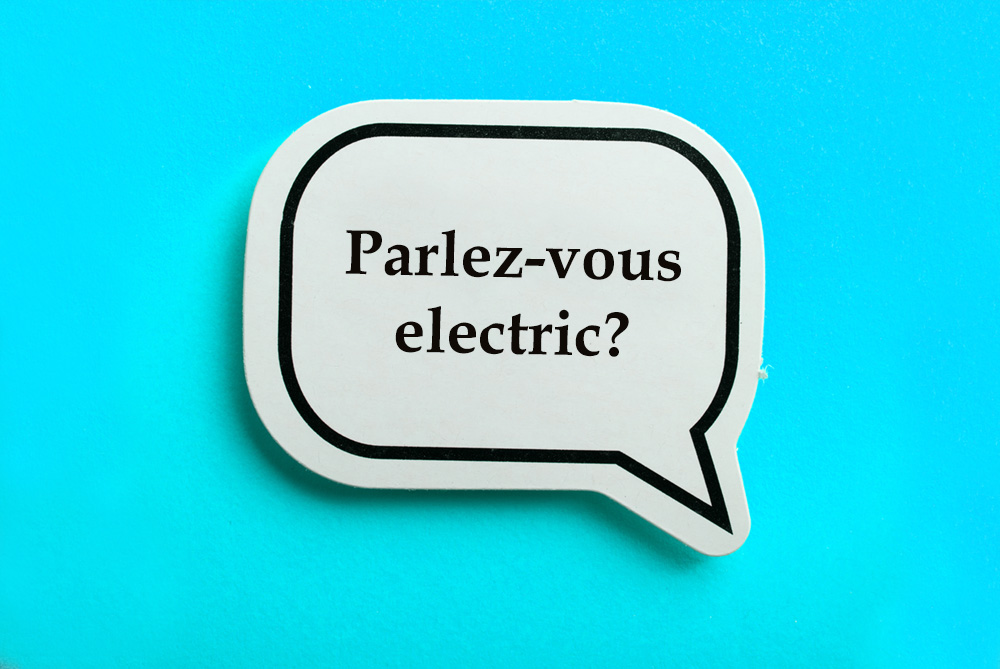S h a r e
The new language of EVs


Posted by
Martin Brown
February 2020
I’m learning a different language.
It’s kWh rather than mpg. I mean we have all become used to mpg, even though our fuel is delivered in litres. But no matter…
Anyway, on the road to zero emissions and electric cars, we need to come to terms with this new language. And you won’t find it on a Babbel or Rosetta Stone course.
So what is kWh? It’s the shorthand for kilowatt-hours and refers to the amount of energy transferred in one hour by 1,000 watts of power.
This is the base step for the new EV lingo because battery-electric cars are measured in kilowatt-hours. A kilowatt-hour gives you about 4 miles of range in an EV.
So I’ve mastered this bit of the hieroglyphics of EV motoring.
Next, how quickly does your battery-electric car charge up? This is related directly to the kWh measurement of your car’s battery.
Think of it in terms of fuel where the battery is the ‘tank’ and electricity the ‘fuel’. To squeeze the fuel into the battery you divide the battery size by the speed of your charger. In other words, the faster the charger, the more fuel it can transfer more quickly into the tank.
There are basically three types of home charger:
- A 3.7kWh which is a slow charger and marginally quicker than a three-pin plug (although you shouldn’t charge your EV from the mains like that). Many street lamp post chargers are between 3-6kWh rated.
- A 7kWh charger known as a fast charger.
- And a 22kWh fast charger.
For most domestic installations a 7kWh charger is usually enough.
Then to find out how long it will take you to charge your car, you divide the size of the battery by the charging speed. So a Nissan Leaf e+ has a 62kWh capacity battery. With a 7kWh home charge point, this will take about nine hours to charge to 100%.
So all that’s fairly easy.
On the road, you can find rapid chargers with up to 50kWh charging speed which would take just over an hour to get the Nissan fully charged again. While ultra-rapid chargers offer 150kWh or even 350kWh for IONITY chargers.
But be warned – these can be very expensive to use – the equivalent of filling up with fuel at a motorway service station. Which is not to be encouraged.
In anybody’s language.
There we are then. EV-speak. Mastered.
You also might like…
If you liked this article then check out our posts about similar topics
Which is better – cash allowance or salary sacrifice?
The choice between a car allowance and salary sacrifice comes down to a balance of flexibility and value A cash allow...
The pros and cons of car salary sacrifice
Demand for car salary sacrifice is growing as an increasing number of companies offer the benefit to their employees ...
How does benefit-in-kind affect electric cars?
If you have a company car that is available for private use, including commuting, then it becomes liable for company car...
How does salary sacrifice work for a car?
Salary sacrifice for a car is exactly the same as any other employee benefit You exchange some of your salary for a bene...
Is it worth launching a car salary sacrifice scheme?
Salary sacrifice is an increasingly popular way of giving all qualifying employees the opportunity to source a new car i...
Salary sacrifice and the Budget cut to National Insurance
In January 2024, the rate of National Insurance dropped from 12% to 10% A further reduction of 2% was announced by the C...
Senior appointments drive Fleet Alliance’s Sustainable Mobility strategy
Fleet Alliance has made a number of senior appointments to underpin the growth of the fleet management provider as a sus...
New Renault 5 heads wave of sub £25,000 EVs
It was not hard to pick out the Renault stand at this year’s Geneva Show, thankfully revived after five years away, si...
Ready to make the management of your fleet more efficient?
Request a call back
